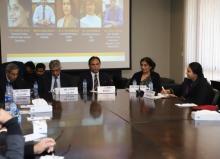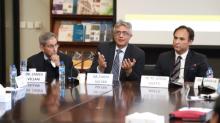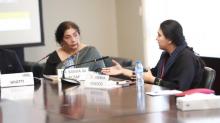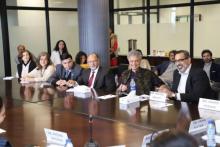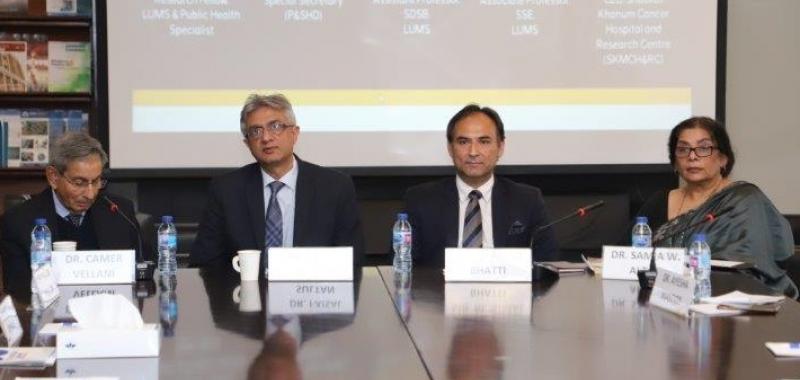
Friday, February 21, 2020
Suleman Dawood School of Business - LUMS is hosting a series of events to encourage dialogue and discussion on healthcare in Pakistan. The first event was a panel discussion titled, “Wicked Problems in Healthcare: Seeing the Big Picture”.
The panel included the following health sector experts from academia, the private sector, and government:
- Dr. Samia W. Altaf (Research Fellow LUMS & Public Health Specialist)
- Mr. M. Ajmal Bhatti (Special Secretary Primary & Secondary Healthcare Department, Government of Punjab)
- Dr. Ayesha Masood (Assistant Professor SDSB & Programme Director MS Healthcare Management and Innovation)
- Dr. Faisal Sultan (CEO Shaukat Khanam Memorial Cancer Hospital and Research Centre)
- Dr. Camer Vellani (Distinguished University Professor Emeritus, Aga Khan University)
The panel was welcomed by Rector LUMS, Mr. Shahid Hussain, who emphasised the importance of a global shift in healthcare management and the need to build a community of leaders for the national healthcare industry. He also added that SDSB’s three new Master of Science programmes were designed to tackle national challenges in the years to come.
Speaking at the occasion, Vice Chancellor LUMS, Dr. Arshad Ahmad, remarked that LUMS has an institutional priority and commitment to the wellbeing of its students and society at large. He added that promoting health and wellbeing is a top priority which requires ownership at all levels of government, business, and industry.
Honorary Dean SDSB, Dr. Alnoor Bhimani, added that SDSB-LUMS is actively seeking to impact the practice of management in areas of social development. The new MS Programme in MS Healthcare and Innovation is one such initiative, that would impact policymaking and health services management in the years to come. He added that SDSB would serve as a base for academic experts, policymakers, and practitioners of healthcare to brainstorm and come up with collaborative solutions to tackle real world problems.
The panel began with an overview of the existing dilemmas in the local healthcare sector; core issues such as sociocultural factors, lack of required funding and infrastructure, and shortage of skilled human resource.
Dr. Samia W. Altaf shared findings from her recent research, and highlighted institutional challenges in terms of curative and preventive health services. She maintained that services at basic units of primary and secondary healthcare need to be enhanced.
Mr. M. Ajmal Bhatti appraised the audience about institutional challenges, supply chain management practices, and infrastructure and human resource issues. He further emphasized the need for effective data management through the efficient use of information and communication technologies. Mr. Bhatti went on to highlight the need for management training of medical professionals appointed as administrative heads at hospitals, clinics, and other health units. He appreciated SDSB-LUMS’ initiative of launching the MS in Healthcare Management and Innovation.
Dr. Faisal Sultan proposed that administrators at large government hospitals need to be empowered to make the most suitable decisions on their own. He emphasized the need to devolve governance to the basic unit level with medical professionals and administrators working in tandem to ensure cost-efficient, locally adaptable, and practicable solutions.
Dr. Camer Vellani steered the conversation towards medical education and the need to enhance competence at all levels of society to improve health and wellbeing. He shared that Pakistan is one of the most philanthropic nations on the planet with tragic socioeconomic indicators. The preventive model of healthcare has long been ignored due to a combination of sociocultural, financial, and infrastructure related issues. Decision-makers have preferred establishing state of the art hospitals to treat complex health issues instead of bolstering the primary healthcare system to avoid such issues in the first place.
The panellists unanimously agreed that a lack of ownership of healthcare problems was a major challenge Pakistan faced. They also agreed that social and rural development went hand in hand with health, and a collaborative approach at the government level was essential in order to reduce the burden of disease in the years to come.
Concluding the discussion, SDSB faculty and Programme Director MS Healthcare Management and Innovation, Dr. Ayesha Masood expressed the need to improve governance in the health sector. She added that legislative weaknesses, combined with disproportionate and uneven utilisation of resources were exacerbating health challenges. The panellists expressed their commitment to promote collaboration across sectors through similar panel discussions and related events.
The session closed with a presentation of souvenirs to the panellists, followed by networking tea.
